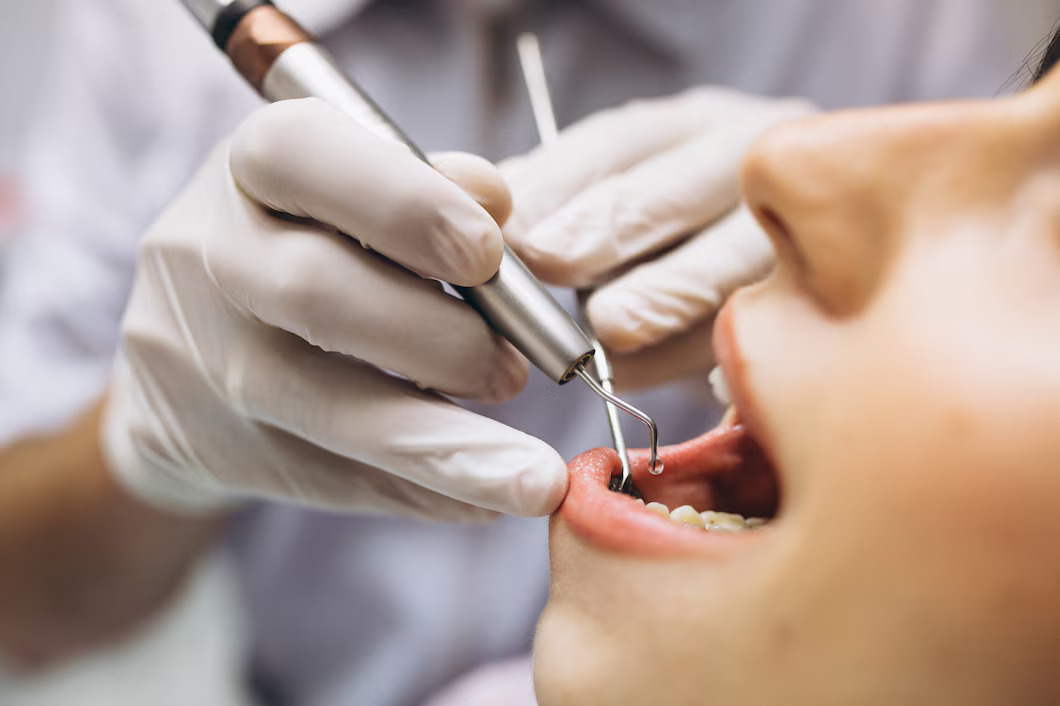Diabetes is a health condition that affects various aspects of the body, including oral health. People with diabetes often face a higher risk of health complications, particularly related to their teeth and gums. This is why routine dental check-ups are crucial for diabetic patients, not only to maintain oral health but also to prevent more serious issues. The close relationship between diabetes and dental health makes proper dental care one of the important steps in effectively managing diabetes.
One of the main issues frequently experienced by diabetic patients is gum disease. High blood sugar levels can damage blood vessels throughout the body, including in the gum tissue. This reduces blood flow to the gums, which in turn slows down the healing process and increases the risk of infection. Regular dental check-ups allow dentists to detect early signs of gum disease, such as gingivitis or periodontitis, so treatment can begin early before the condition worsens.
Additionally, diabetes can cause reduced saliva production, leading to dry mouth or xerostomia. Saliva plays an essential role in maintaining oral hygiene by helping to wash away food particles and bacteria. When saliva production decreases, the risk of cavities and oral infections increases. With regular dental check-ups, the dentist can offer additional care recommendations, such as the use of mouth moisturizers or adjustments to medications that may affect saliva production.
Another complication often faced by diabetic patients is that infections take longer to heal. Oral wounds, such as those resulting from dental procedures or gum infections, may take longer to heal in diabetic patients compared to those without diabetes. Uncontrolled blood sugar levels can worsen this situation, making diabetic patients more susceptible to infections that can spread to other parts of the body. Regular dental check-ups can help detect these issues early and ensure proper management, preventing further complications.
In addition to maintaining oral health, regular dental check-ups also play a role in blood sugar control. Infections in the gums or teeth can increase inflammation in the body, which can, in turn, affect blood sugar levels. By preventing oral infections through good dental care and regular check-ups, diabetic patients can better manage their blood sugar levels, which is crucial for effective diabetes management.
It is also important to remember that education is an integral part of dental check-ups for diabetic patients. Dentists not only perform exams but also provide information and advice on how to maintain oral hygiene at home. For example, diabetic patients need to brush their teeth more thoroughly, floss regularly, and may require additional treatments like antibacterial mouthwashes. All these steps are designed to help reduce the risk of common oral health problems faced by diabetic patients.
During the free eye and dental check-up event held by the community service team as part of the 64th UGM Anniversary, Dr. drg. Ahmad Syaify, Sp. Perio(K), added that periodontitis is also often caused by complications from diabetes. Symptoms include loose or wobbly teeth even if the teeth are not decayed or brittle.
Overall, regular dental check-ups are extremely important for diabetic patients as they help prevent serious oral health complications and improve their quality of life. By maintaining the health of their teeth and gums, diabetic patients can reduce the risk of complications and improve blood sugar control, which ultimately supports comprehensive diabetes management.
Regular dental check-ups for diabetic patients contribute to efforts in maintaining overall health by emphasizing the importance of dental care to prevent serious complications that can affect the well-being of diabetic individuals. This supports the Sustainable Development Goal (SDGs), particularly SDG 3: Good Health and Well-being.
By promoting the importance of dental check-ups specifically for diabetic patients, we can help reduce disparities in access to relevant healthcare, particularly for groups vulnerable to specific complications like diabetes. This also supports SDG 10: Reduced Inequality. Proper dental care and early prevention can reduce the need for more intensive or surgical treatments in the future. This aligns with responsible healthcare consumption in terms of both resources and costs, supporting SDG 12: Responsible Consumption and Production.
Author : Rizky B. Hendrawan | Photo : Freepik

